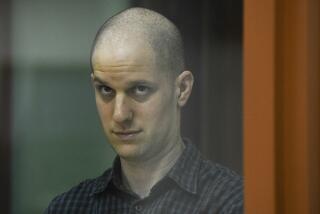U.S. Options Slim in Daniloff Case : But Officials Won’t Rule Out Freeing Alleged Soviet Spy
- Share via
SANTA BARBARA — The Reagan Administration believes that it has few viable options in its efforts to win the freedom of an American news correspondent who has been detained in the Soviet Union.
But senior officials, while clearly not ruling out trying to gain his release by freeing a Soviet employee of the United Nations charged with espionage, indicated Tuesday that they feel under no pressure to move quickly.
One aide held out the possibility that the Administration would let the Soviet Union know that the reporter’s continued detention could have repercussions on an eventual summit conference between President Reagan and Soviet leader Mikhail S. Gorbachev.
However, while the Administration appears to be trying to keep the detention of Nicholas Daniloff of U.S. News & World Report from upsetting the broad scope of U.S.-Soviet relations, one official--a hard-liner among national security aides--said: “I don’t see how it can’t have any effect, especially if they’re not releasing the guy for the next 10 days.”
A Soviet official has been quoted as saying that a 10-day investigation would be conducted, after which Daniloff would be put on trial. (In Moscow, a Soviet Foreign Ministry official indicated Tuesday that judicial authorities will decide whether the case should go to court after a police investigation is completed).
Daniloff was arrested last Saturday and the 10-day period expires on Sept. 9, the date that the Soviet national is due to appear at a preliminary hearing in New York on spy charges.
“The sticking point, or what we suspect is the sticking point, is that the Soviets are ticked off at the fact” that the Soviet citizen arrested in New York, Gennady F. Zakharov, is being prosecuted as a spy, rather then simply being sent back to the Soviet Union, said a senior Administration official, speaking on the condition that he not be identified.
Zakharov was arrested on Aug. 23, and Daniloff was detained by the KGB, the Soviet secret police, a week later.
“This is tit-for-tat retaliation,” said the official.
Officials who traveled to Santa Barbara with President Reagan, and other senior aides in Washington, portrayed the government as stymied by the case, and one remarked:
“It’s a waiting game. It’s who blinks first. What do you do? You just continue to negotiate and protest. Otherwise, you get into the swap category.”
And a swap, he said, is “something that’s a potential.”
Other than slowing progress toward a summit conference, according to officials and experts in U.S.-Soviet relations outside of the government, few options are available to the Administration. They include:
--Postponing scheduled meetings on Sept. 19 and 20 of Secretary of State George P. Shultz and Soviet Foreign Minister Eduard A. Shevardnadze.
--Trying to draw public attention in Europe to the case to undercut Gorbachev’s efforts to curry favor among the Western allies.
--Canceling a series of arms control talks expected to take place at the end of this week between U.S. and Soviet delegations.
However, one senior official said, unless the incident escalates into a more serious situation, none of these options is likely to be pursued.
Rather, he said, “we’re going to dangle” in front of the Soviets the possibility that Daniloff’s continued detention would have repercussions on the chances for a summit conference.
Another well-placed aide said that the decision-makers are “still casting about on the viable options.” But, he added, “I don’t get any feeling anyone is going to crash down and put everything in a state of limbo. The comments are going to be cautious. I don’t think we’re going to topple American foreign policy for the sake of Nick Daniloff.”
In nearly identical statements by White House spokesman Larry Speakes, who accompanied the vacationing Reagan to Santa Barbara, and by State Department spokesman Charles Redman in Washington, the government said that it would not speculate on the likelihood of a swap involving Daniloff and Zahkarov.
“We can’t rule out that the Soviets are trying to influence the Zakharov case by arresting Daniloff,” the statement said. “The two cases, however, are completely different in nature.”
“The Zakharov case will be prosecuted on its merits in strict conformity with U.S. law,” the statement said, while Daniloff is being held on “trumped up” charges.”
Despite the suggestion that Zakharov would be prosecuted, an official said the government statement would not preclude trading Zakharov for Daniloff. “You can speculate it does not rule out a swap,” the official said.
Times staff writers Bob Secter and Doyle McManus in Washington contributed to this story.
Soviets deny retliation in arrest of Daniloff. Page 6.
More to Read
Sign up for Essential California
The most important California stories and recommendations in your inbox every morning.
You may occasionally receive promotional content from the Los Angeles Times.













